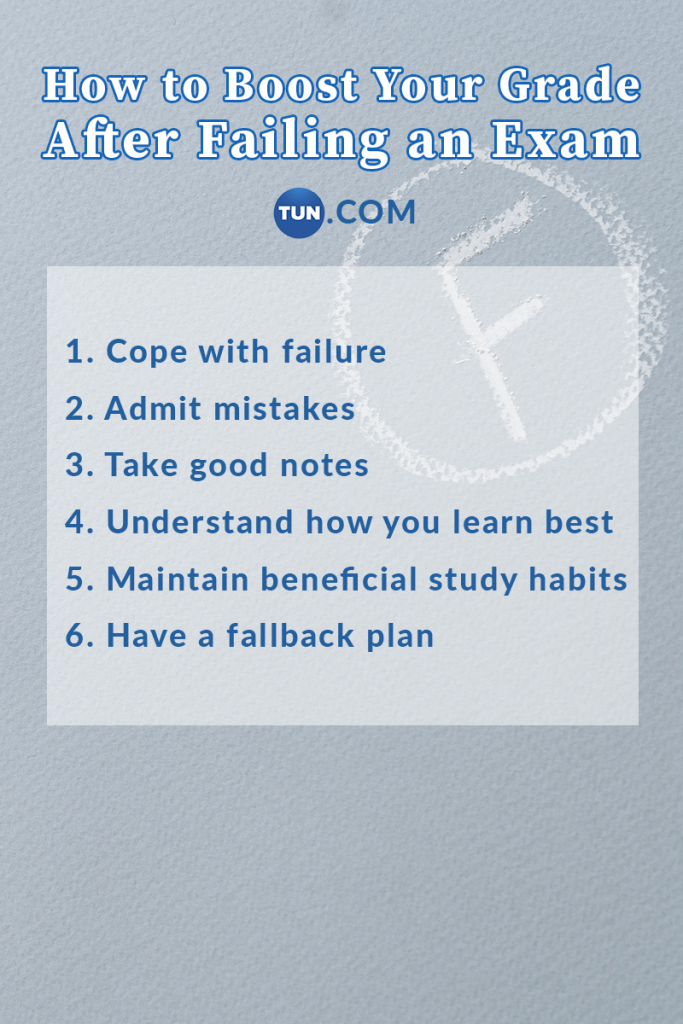*Updated April 20, 2021
Don’t worry if you failed an exam; you can grow from this. I know, it sounds like I’m your best friend giving you the textbook response, but failing an exam, especially at the beginning of the term, most likely won’t be that catastrophic. There are many simple ways to get your grades back on track, if you set your mind to it.
Here are six steps to boost your grade after failing an exam.

[divider]
Cope with failure
Whether you didn’t spend enough time studying or are taking a class outside of your comfort zone and legitimately can’t grasp the information, we all deserve some time to feel sorry for ourselves. Truthfully, failing an exam is just a speed bump in life. It happens to everyone, and it can even motivate you to study harder for the remainder of the term, thus forcing you to retain the information. The best advice is, don’t be discouraged. Don’t give up on the class and count it as a loss. Failure is only beneficial when it is used as a tool for motivation.
[divider]
Admit mistakes
Yes, for a few hours you can curse your teacher or professor for all of their trick questions and typos, but the first step to healing is acceptance. What caused you to fail this exam? Was it a lack of studying? Did you stay up late the night before or have trouble sleeping? Were you too confident and brushed the exam off? Or, do you need legitimate tutoring?
[divider]
Take good notes
Good, that step is over. You’ve admitted your mistakes. The next step is to make sure that you’re taking good notes.
There are all types of different note-taking styles and techniques that you can test out to find what works best for you.
@kuroristudies, a study influencer on Instagram, suggests reviewing the day’s material before class starts and jotting down some notes. That way, during class, you can just add any relevant information you pick up.
Another influencer, @megansstudies, suggests trying to condense each day’s notes to one page.
“This forces you to think of what is most important to include because, well, if it’s important enough, then you will want to include it in the one-pager,” she said.A third study influencer, @sicistudies, said one of the keys to retaining information that you include in your notes is to review the material soon after class. At most, you can wait two days, she said. But as soon as possible, you should create flashcard decks and draw out diagrams or mind maps for the more difficult topics.
[divider]
Understand how you learn best
It is also important to understand how you learn best and to mold your study habits around your learning style.
Visual learners, for example, may benefit from making flashcards, while auditory learners may retain information best by listening to recordings of lectures, lessons, or classroom discussions.
And those who feel particularly anxious or weighed down by the thought of studying may benefit from using the Pomodoro study method. The method uses a timer to break down studying into intervals of 25 minutes with short breaks in between. During the breaks you can get on your phone, take a walk around the block, or make a quick bite to eat.
But, no matter your preferred method of studying, you should always make an effort to actively engage your brain, rather than just going through the motions.
If you’re creating a study guide, for example, UNC Chapel Hill’s Learning Center suggests writing down as much as you can from memory before using your notes to fill in the gaps. This will help you better understand what you do and don’t know so that you can focus your studies effectively.
And after a little while, when you think you have a decent grasp on the information, try to “become a teacher” by explaining the material to a friend or even back to yourself, UNC Chapel Hill’s Learning Center suggests. Metacognition, which is reflectively thinking about what you do and don’t know, is key to making your study efforts effective, the learning center adds.
[divider]
Maintain beneficial study habits
Finding good, quiet places to study can be a difficult task for both high school and college students. College libraries can sometimes be more reminiscent of a cafeteria than a study spot, and high school students often have to study at home, where distractions can be plentiful.
If you’re a college student attending a large state university, there are often small quiet study rooms on the top floors of the library. If you are the type who performs best in groups, chances are you can reserve individual study rooms.
If you’re a high school student, try to find the quietest place in your house and speak with your parents and siblings about giving you space during certain hours of the day. If that doesn’t work, ask your high school counselors and teachers if there are any after-school study sessions that you can attend.
It’s also imperative to dedicate specific times throughout the week to study. Yes, it’s hard because we all have the tendency to procrastinate, but in this case, it’s important to stop procrastinating and become productive so you can get ahead.
For additional study tips, check here.
For tips on how to study without stress and anxiety, check here.For tips on how to study for online classes, check TUN’s interview with Rebecca Piety, director of testing and evaluation at the University of Central Florida.
[divider]
Have a fallback plan
Sometimes, a failed exam can be a sign that you simply won’t do well in a class. So, it is important to have a plan to fall back on.
If you’re a college student and it is too late in the term to improve your grade, there is no shame in dropping the course and trying again the next semester. College forces students to step outside their comfort zone academically, but the repercussions for failing a class, unfortunately, aren’t a mere slap to the back of the head. Scholarships are dependent on grade point average. Universities install add and drop dates for classes for exactly this reason.
If the class you are failing is within your major, it would be in your best interest to speak with an advisor. If you are early on in your course load, you could be suffering through the infamous weed-out class. Or your chosen major could just not be what you anticipated.
If you’re a high school student, however, you may not have the option to drop a class. For that reason, it is important to try your hardest throughout the entire year and seek all of the outside help that you can. Each quarter matters. And if you’re able to improve your grade by a letter or two over the course of the year, that makes a huge difference. To college admission offices, there is a huge difference between an F and a D or a D and a C.
However, next year, you may want to consider going down a level. For example, If you’re struggling in pre-calculus but are still able to pass the class with a D or a C, you should talk to your counselors about the right math path for you in lieu of calculus. Colleges and universities tend to prefer to see an A or B in a regular class than a D or F in an advanced class.
Conclusion
It is important to be pragmatic when evaluating your grade in a class. Individually, you know when you are truly struggling or just not trying hard enough. There are simple approaches to both issues. The most important thing to remember is, you can bounce back from a failed exam.



